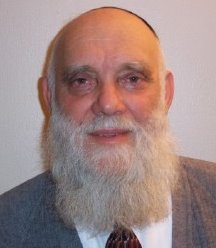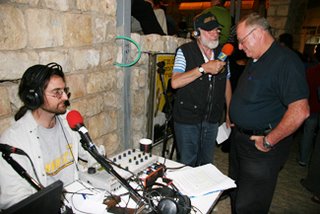Tsfat Band´s New Album Urges Listeners to "Never Give Up"
July 20, 2006 / 24 Tammuz 5766
by Benyamin Bresky  |
| Though released several months before the current rocket attacks on their home town in northern Israel, Simply Tsfat's new album is appropriately titled 'Never Give Up'. |
The lyrics of the title track read: "There is always hope...never despair" - a theme that runs through all the band's music. A message from the band's web site states the band's members and their families are staying put in the missile-battered city of Tsfat despite the fact that a rocket hit one of their neighbors' houses.
The new album, the band's fifth, is a collection of hassidic melodies and original material performed on violin and acoustic guitar. Some songs are sung in Hebrew, some in Yiddish and some in English - a few mix the languages. Many of the songs are instrumental in the klezmer style.
Although the band members attend the Breslov hassidic synagogue in Tsfat, the album has songs from other hassidic groups as well, including Chabad and Satmar. Tracks include the Yiddish classic Oyfn Pripetshik, from the 1800s, which is sung by the band members' children. One of the catchiest is Rav Klein's Niggun, often performed at their concerts and written by the rabbi of their synagogue, who says he learned it from his father. The fast-paced rhythm sounds almost like American bluegrass if not for the
ai yai yai chorus.
If one hears influences from other musical genres in Simply Tsfat, it is not a coincidence. The trio has not always worn traditional black hats and long black coats of hassidic Jews.
Israeli-born guitar player Yonatan Tzarum was taught flamenco guitar by his father. He gave it up, he says, because "I wanted to play basketball and football with my friends." He returned to music as a teenager and eventually became the bass player for a heavy metal band in Japan. Upon his return to Israel, "I realized that there is G-d in the world, and I start to grow these," he says with a smile, referring to his long curly sidelocks, which he kisses.
Although Tzarum is now dedicated to the Simply Tsfat style of music, he doesn't completely reject other genres. "They say since the Beit Hamikdash (Holy Temple) was destroyed, all the music of the Leviim (the Levites, who made music in the Temple), everything dispersed, fell down for all the world," Tzarum says. "This is the reason, sometimes we hear Pink Floyd or whatever, we feel excitement. We feel that something belongs to us. The problem is, it’s filled with a lot of nonsense as well. Some music, when we hear it we feel down." Tzarum has now replaced the melancholy and despondent chords of the hard rock he loved with the spirited Breslov melodies.
American-born violinist Yehonasan Lipshultz has a similar story of returning to his roots. Starting violin at the age of seven, little by little Lipshultz gave up music as he and his wife became more and more religious. Eventually he sold his violin to finance the down payment on their house. A book by Rabbi Nachman of Breslov encouraged him to continue becoming more and more religious and to eventually move to Israel arriving two weeks before the beginning of the Gulf War.
Lipshultz became enthralled by the Shabbat songs in the local Breslov synagogue in Tsfat. "I started learning all these beautiful niggunim instead of Bach and Beethoven and Mozart. One day I said, gee, I could play those melodies, if only I had a violin." When he was in the town of Uman, Ukraine - the burial place of Rabbi Nachman - that he saw a man selling a violin on the street for 10 dollars. For Lipshultz, it was the answer to his prayers. "We don't always get the answers we want, when we want them, but sometimes talking to G-d works," he says.
Although Lipshultz too, incorporates some of his musical past in Simply Tsfat's music, he doesn't miss classical music. "As I started reconnecting with my Jewish past, I started thinking - no - feeling, how all that musical culture stood by, as a supportive witness, while we walked to the gas chambers."
As far as Tsfat is concerned, the band members agree that the ancient hilly, northern city is very conducive to music. "It's a very mystical city," says Lipshultz. "The four holy cities of Israel are compared to the four elements: water (Tiberias), fire (Jerusalem), earth (Hevron) and air. Tsfat corresponds to air. You hear the music. It all works with air. You can really feel the holiness here."
The band is currently still playing gigs throughout the country and then returning home to Tsfat, despite the continued rocket attacks. One can be sure that if Simply Tsfat is still in the bomb shelters as you're reading this article, they're singing, dancing and playing to their fellow residents.
For more information visit SimplyTsfat.com. Special thanks to A Simple Jew.Benyamin Bresky is the host of The Beat on Israel National Radio. He
maintains a music journal at http://israelbeat.blogspot.com.







